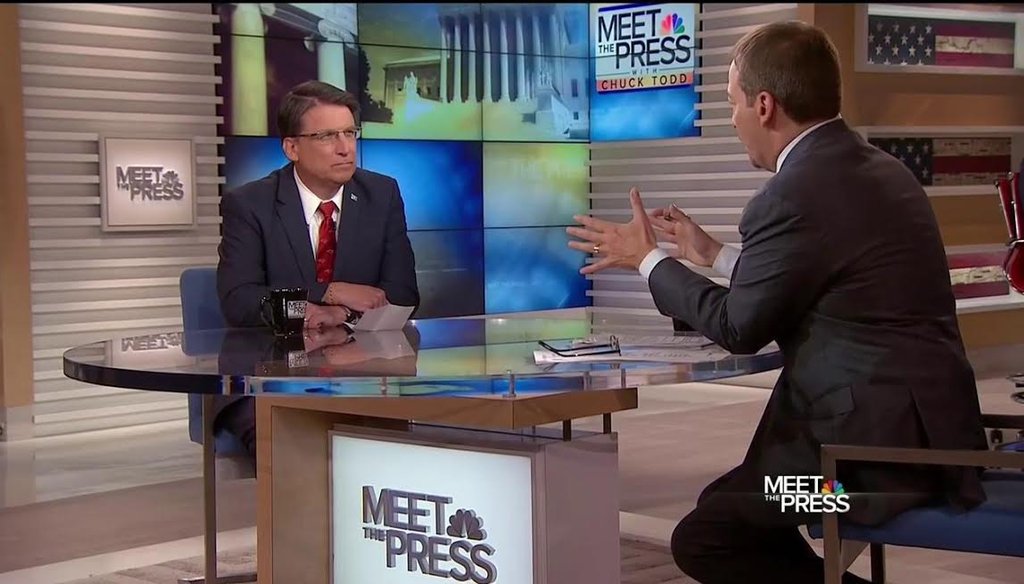Stand up for the facts!
Our only agenda is to publish the truth so you can be an informed participant in democracy.
We need your help.
I would like to contribute

N.C. Gov. Pat McCrory defended his state's HB2 on "Meet the Press" April 17 in an interview with Chuck Todd. (NBC News)
North Carolina Gov. Pat McCrory stood by a state law that spurred many businesses, Bruce Springsteen and gay-rights groups to condemn his state, saying Sunday the measure was a necessary response to local government overreach.
Meet the Press moderator Chuck Todd asked McCrory, Charlotte’s former mayor of 14 years, if North Carolina leaders had not overreached in the same way by nullifying the Charlotte city council’s LGBT anti-discrimination ordinance.
"I made a point when I was mayor of Charlotte for 14 years, we dealt with fire and police and airports and roads and light rail lines, we didn't impose new regulations on businesses," he said. "And I don't think the government ought to be the H.R. director for every business, whether it be in Charlotte or whether it be in Greensboro or whether it be in Boone, N.C."
McCrory has characterized the now-defunct ordinance this way from the beginning in statements, videos and most recently his national interview with NBC host Chuck Todd.
"The city of Charlotte passed a bathroom ordinance mandate on every private-sector employer in Charlotte, N.C," McCrory said. "It's not government's business to tell the private sector what their bathroom, locker room, or shower practices should be. Not only the private business, but also the YMCA and other non-profit organizations."
Certainly many businesses would have been affected, but not every one, as McCrory said. McCrory’s description rates Mostly False.
Josh Ellis, McCrory’s spokesman, called the ordinance a mandate on "every private business open to the public." The extra distinction about the "public" is important.
Under the Charlotte ordinance, it would have been illegal for places such as stores, hospitals, movie theaters, restaurants and hotels to prohibit transgender customers from using the bathroom or locker room with the gender he or she identifies with.
But the ordinance would have specifically exempted establishments closed to the general public like private clubs, religious and advocacy organizations with beliefs that are at odds with the law like churches, and nonprofits such as homeless shelters.
Practically speaking, it also would not have affected large swaths of private-sector businesses that don’t deal with the public face-to-face on a daily basis. Think call centers, distribution warehouse, manufacturing plants, etc. Not to mention private employers who aren’t required to have a public bathroom.
Clooney talks campaign cash
Actor and activist George Clooney also appeared on Meet the Press to talk about a dinner he hosted for Hillary Clinton at his California home. Clooney said he didn’t disagree with Bernie Sanders supporters who threw dollar bills at Clinton’s motorcade in protest of the big-money political event.
"It is an obscene amount of money. The Sanders campaign when they talk about it is absolutely right," Clooney said. "It's ridiculous that we should have this kind of money in politics. I agree completely."
But Clooney said the money he helped raise for Clinton in California has to be put in perspective.
"The overwhelming amount of money that we're raising, and it is a lot, but the overwhelming amount of the money that we're raising, is not going to Hillary to run for president, it's going to the down-ticket," he said. "It's going to the congressmen and senators to try to take back Congress."
Clooney’s claim is largely correct. It rates Mostly True.
The Clinton fundraisers Clooney was talking about were on behalf of the her Hillary Victory Fund, which distributes the donations to several entities — her campaign committee (Hillary for America), the Democratic National Committee, and the state parties.
Because federal law says individuals can't give more than $2,700 to a presidential candidate's primary campaign (another $2,700 can be collected for the general election), Clinton's Victory Fund has set up its rules so that the first $2,700 donated goes to her.
The next $33,400 goes to the Democratic National Committee (the maximum allowed for an individual under federal limits) and the remainder is split among 32 state parties to finance federal candidates. The federal limit for each state is $10,000.
So if a large donor gives $356,000 to the Victory Fund, Clinton would directly get less than 1 percent.
If a small donor were to give $3,000, the Clinton campaign would directly get 90 percent.
Our Sources
See fact-checks.































